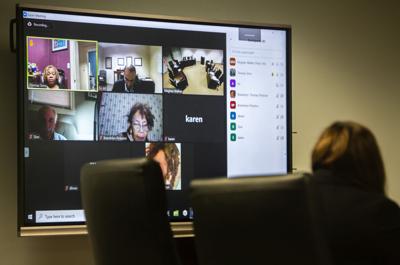COLUMBIA — The State Ethics Commission will no longer silence whistleblowers who file complaints accusing South Carolina public officials of misconduct, agency leaders decided this week.
The move reverses a practice that goes back at least to the early 1990s. It has long been criticized for giving cover to politicians accused of misconduct and shielding the Ethics Commission itself from scrutiny of how it addresses those allegations.
The change comes seven months after a Columbia attorney filed a federal lawsuit alleging the public misconduct watchdog’s gag orders violate free-speech protections that are guaranteed in the First Amendment to the U.S. Constitution.
The Ethics Commission has already revised its official complaint form, deleting language that warned citizens that they could be prosecuted for a misdemeanor, fined up to $1,000 and jailed for a year for speaking out about their allegations before the agency’s investigators have vetted and verified them.
Chris Kenney, the attorney who filed the lawsuit on behalf of a client whose complaint against a state lawmaker was dismissed, praised the Ethics Commission’s decision. He said he expects to see whistleblowers speak out when they think their complaints were dismissed because of flaws in the state’s loophole-riddled Ethics Act or shortcomings in the Ethics Commission’s investigation.
“For decades, the Ethics Commission has intimidated citizens into not speaking about complaints that they filed,” Kenney said. “This is a positive development in terms of free speech and the right to criticize public officials and public bodies and the work of the Ethics Commission.”
The Ethics Commission says the change applies to past complaints as well as future ones.
For decades, the agency held up the threat of criminal charges to keep those who had filed complaints from speaking publicly about their allegations — at least until the Ethics Commission has investigated the claims and decided to bring charges. Whistleblowers whose complaints were dismissed by the commission in secret proceedings were bound to never speak of their allegations again.
The Ethics Commission clamped down on a whistleblower as recently as 2020. That October, the agency brought a case against a Beaufort County resident who had provided a local newspaper with a copy of her ethics complaint against a school board member. The resident got credit in that case for contacting the newspaper and persuading the reporter not to run a story about her complaint. She received a warning.
The practice of muzzling citizens appeared rooted in the state Ethics Act, which requires that documents involving pending ethics cases remain confidential.
But after Kenney filed his lawsuit, leaders of the S.C. Senate and House intervened in the case and clarified that they didn’t intend for state law to silence whistleblowers. The lawsuit is expected to be settled soon.
In an advisory opinion the Ethics Commission published this week, it wrote that a closer review of the ethics law reveals that its confidentiality requirements apply only to the commission, not to citizens who file complaints.
“That is fabulous news,” said Lynn Teague, a good government advocate for the League of Women Voters. “The public has been shut out by that provision, and the public should be aware of how they’re handling things.”
The reversal accompanies heightened attention toward how well the Ethics Commission serves its function as one of the state’s top misconduct watchdogs.
For years, the Ethics Commission has routinely let public officials off with light punishments, dismissed cases on technicalities and rarely referred its findings to law enforcement, The Post and Courier revealed in November.
The newspaper’s Uncovered series also detailed how the agency struggles to collect ethics fines from uncooperative politicians, including some 50 sitting officials who stiff arm the commission even as they seek and win reelection.
Kenney filed the lawsuit on behalf of an unnamed client who filed an ethics complaint concerning a state lawmaker. The complaint alleged that the lawmaker improperly voted on a bill to benefit a special interest that had paid the lawmaker some $108,000 over the course of three years.
Kenney said his client was incredulous that the Ethics Commission determined the allegations were true, yet found the lawmaker’s actions didn’t violate the state ethics law. His client wanted to lobby the Legislature to tighten the law but couldn’t speak about the ethics case since the commission had dismissed it in a secret hearing.
Now, they can.










